高考英语专题讲练五:动词的时态和语态
专题05 动词时态语态(现在时)(讲案)-2025年高考英语一轮复习知识清单(全国通用)含解析
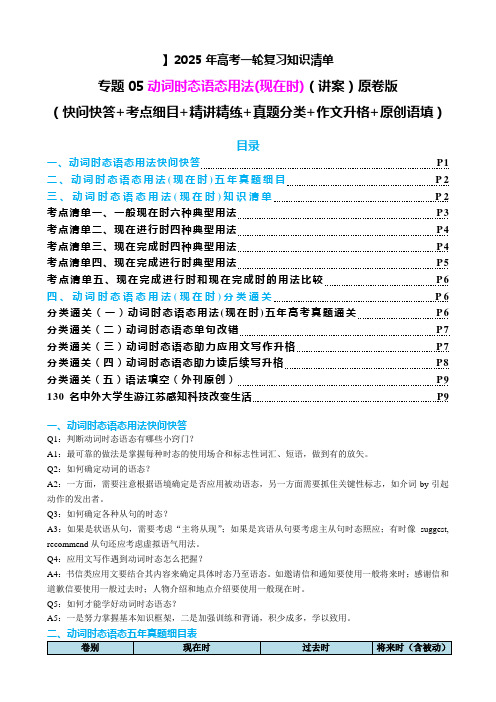
】2025年高考一轮复习知识清单专题05动词时态语态用法(现在时)(讲案)原卷版(快问快答+考点细目+精讲精练+真题分类+作文升格+原创语填)目录一、动词时态语态用法快问快答P1二、动词时态语态用法(现在时)五年真题细目P2三、动词时态语态用法(现在时)知识清单P2 考点清单一、一般现在时六种典型用法P3 考点清单二、现在进行时四种典型用法P4 考点清单三、现在完成时四种典型用法P4 考点清单四、现在完成进行时典型用法P5 考点清单五、现在完成进行时和现在完成时的用法比较P6 四、动词时态语态用法(现在时)分类通关P6 分类通关(一)动词时态语态用法(现在时)五年高考真题通关P6 分类通关(二)动词时态语态单句改错P7 分类通关(三)动词时态语态助力应用文写作升格P7 分类通关(四)动词时态语态助力读后续写升格P8 分类通关(五)语法填空(外刊原创)P9 130名中外大学生游江苏感知科技改变生活P9一、动词时态语态用法快问快答Q1:判断动词时态语态有哪些小窍门?A1:最可靠的做法是掌握每种时态的使用场合和标志性词汇、短语,做到有的放矢。
Q2:如何确定动词的语态?A2:一方面,需要注意根据语境确定是否应用被动语态,另一方面需要抓住关键性标志,如介词by引起动作的发出者。
Q3:如何确定各种从句的时态?A3:如果是状语从句,需要考虑“主将从现”;如果是宾语从句要考虑主从句时态照应;有时像suggest, recommend从句还应考虑虚拟语气用法。
Q4:应用文写作遇到动词时态怎么把握?A4:书信类应用文要结合其内容来确定具体时态乃至语态。
如邀请信和通知要使用一般将来时;感谢信和道歉信要使用一般过去时;人物介绍和地点介绍要使用一般现在时。
Q5:如何才能学好动词时态语态?A5:一是努力掌握基本知识框架,二是加强训练和背诵,积少成多,学以致用。
三、动词时态语态用法(现在时)知识清单考点清单一、一般现在时六种典型用法【即时训练】在空白处填入括号内单词的正确形式。
2016年高考英语仿真押题 专题05 动词的时态和语态(含解析)

专题05 动词的时态和语态1.—Mum,you should have taken me to the park this morning.—I had planned to,but I couldn’t afford the time.I ________ a lecture.A.had given B.gaveC.was giving D.would give解析:选C。
考查动词时态。
句意:——妈妈,今早你本应该带我去公园的。
——我原本计划是这样的,但是我没能抽出时间,当时我在做演讲。
根据语境可知,表示过去某一时间正在进行的动作,故用过去进行时。
2.—Good evening.I ________to see Miss Mary.—Oh,good evening.I’m sorry,but she is not in.A.came B.comeC.have come D.had come解析:选C。
考查动词时态的用法。
选项A表示过去所发生的事情;B项表示经常性或习惯性的动作;C项表示目前的情况和影响;D项时态不符合对话的时间和语境。
3.—Hurry up!Alice and Sue are waiting for you at the school gate.—Oh!I thought they ________ without me.A.went B.are goingC.have gone D.had gone4.—Tom is so joyful that he smiles at everyone.—So ________ you if you get the first in the exam.A.do B.areC.would D.will解析:选D。
句意:——汤姆如此高兴以至于见人就笑。
——如果你考试得了第一,你也会这样。
条件状语从句(if...)若用一般现在时,则主句要用一般将来时;此句相当于:You will also be so joyful if you get the first in the exam.。
【新高考】高三英语考点汇总:动词的时态和语态

一般时包括一般现在时、一般过去时、一般将来时和一般过去将来时。
一、一般现在时1. 一般现在时的构成一般现在时主要用动词原形来表示。
主语是第三人称单数时,动词后面要加-s或-es。
☞They want good jobs.他们想要好的工作。
☞The coat matches the dress.外衣和裙子很相配。
☞This work does not satisfy me.这项工作我不满意。
☞Do you understand?你懂了吗?2. 一般现在时的用法①一般现在时的基本用法a. 表示现在习惯性的动作或存在状态☞He always takes a walk after supper.晚饭后他总是散散步。
☞Everyone is in high spirits now.现在大家都情绪高涨。
b. 表示客观事实或普遍真理☞The sun rises in the east and sets in the west.太阳从东方升起在西方落下。
☞Sound travels faster through water than it does through air.声音在水中的传播速度要比在空气中快。
☞Time and tide wait for no man.时间不等人。
c. 表示主语的特征、能力和状态☞This cloth feels soft.这布摸上去很软。
☞I love classical music.我喜欢古典音乐。
☞The President still seems able to find time to go fishing.看来总统仍能有时间去钓鱼。
d. 表示按计划或安排将要发生的动作☞The meeting begins at 7:00.会议七点钟开始。
☞We leave here at 8:00 sharp.我们八点整离开这里。
e. 在时间、条件、让步状语从句中表示将来动作☞When you come next time, bring me some magazines.你下次来时,给我带几本杂志。
高三英语一轮复习 语法专练五动词的时态和语态
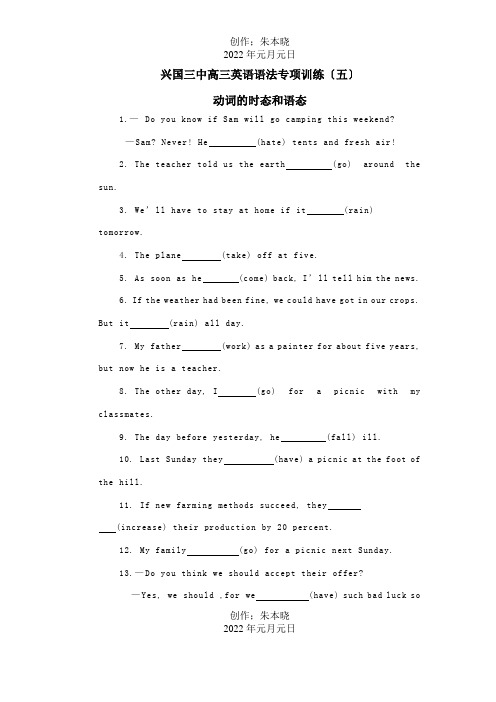
兴国三中高三英语语法专项训练〔五〕动词的时态和语态1.— Do you know if Sam will go camping this weekend?—Sam? Never! He (hate) tents and fresh air!2. The teacher told us the earth (go) around the sun.3. We’ll have to stay at home if it (rain) tomorrow.4. The plane (take) off at five.5. As soon as he (come) back, I’ll tell him the news.6. If the weather had been fine, we could have got in our crops. But it (rain) all day.7. My father (work) as a painter for about five years, but now he is a teacher.8. The other day, I (go) for a picnic with my classmates.9. The day before yesterday, he (fall) ill.10. Last Sunday they (have) a picnic at the foot of the hill.11. If new farming methods succeed, they(increase) their production by 20 percent.12. My family (go) for a picnic next Sunday.13.—Do you think we should accept their offer?—Yes, we should ,for we(have) such bad luck so创作;朱本晓2022年元月元日far, and time (run) out.14. Unless it (rain), we’ll go for a picnic next Sunday.15. Ladies and gentlemen, please fasten your seat belts. The plane (go) through a cloud.16. We were about to leave school it began to snow.17. If you (win) the game, you will have to train hard.18. I’ll take my umbrella in case it (rain).19. Listen! The girl (play) the piano in the next room.20. Look! They (swim) in the lake.21. When I got home, Mum (cook) lunch in the kitchen.22.—I saw Ann at the concert yesterday.—Impossible. She (play) chess with me in my room then.23.—Why did you go to watch the diving competition yesterday?—My brother (play).24. At two o’clock yesterday afternoon, my father(work) in the vegetable garden.25. When they got to the destination, the sun(shine) brightly.创作;朱本晓2022年元月元日26. He said he (return) to his hometown the next month.27.—Lucy, you didn’t come to the ball last night?—I , but I had an unexpected visitor.28. He said they (return) to their motherland in the near future.29. Tom was about to lock the door the phone rang.30. He promised that he (help) me out.31. So far this year we (see) a rise in food prices.32. Since then he (be) in China.33. The construction of the two new railway lines (complete) by now.34. Over the past five years the Greens (plant) thousands of trees on the hill.35. Up to now, he (write) novels.36. By the time I got to school, class(begin).37. The hotel wasn’t particularly good, but I(stay) in many worse hotels.38. By 1980, we (plant) five thousand trees along the road.39. I’m too tried now, for I (work) for about five hours without a break.创作;朱本晓2022年元月元日40. Rio (prepare) for the 2021 Olympic Games in the past few years.41. In the last few months, I (prepare) for the coming examination.42.—Why are you so tried?—I (do) the housework since this morning.43. Since 8 o’clock, Tom (work) in the field.44. No decision (make) about any future appointment until all the members have given their views.45.—What’s the noise?—The machine (repair).46. Up to now, two films (make).47. In recent years two chess clubs (run) to makea profit in my neighbour-hood.48. All the food (eat) up by now.49.—When will the expert come and give the lecture on economic development?—Not until our programme(approve) by the authorities.50. The problem (explain) twice. But I still can’t understand it.51. The project (complete) next month.52. The new house (build) so far.53. My hometown (situate) on the river bank.创作;朱本晓2022年元月元日54. The supermarket (locate) in the centre of the town.55. The water (feel) cold at this time of years.56. The food (taste) good.57. The car (not start) on such a cold day.58. The water (feel) cool when I jumped into the pool for morning exercise.59. Tom is (blame) for the broken window.60. The stamp is well worth (buy). I t’s good value for money.61. My pen (write) well, so I like it very much.62. The war (break) out in 1980.63. Her car needs (wash).64. The cloth (sell) well.65. The reports went missing in 2021 and nobody(see) them since.66. Unless some extra money (find), the theatre will close.67. If we (not act) now to protect the environment, we’ll live to regret it.68. We (leave) very early so we packed the night before.69. “Life is like walking in the snow〞, Granny used to say, “because every step (show).〞创作;朱本晓2022年元月元日70. I had been working on math for the whole afternoon and the numbers (swim) before my eyes.71.—Did you ask Sophia for help?—I (do not) need to-I managed perfectly well on my own.72. The manager (tell) the workers how to improve the programme since 9 a.m.73. Planning so far ahead (make) no sense-so many things will have changed by next year.74. I wasn’t sure if he was really interested or if he(just be) polite.75. When Alice came to life, she did not know how long she(lie) there.76. If you don’t like the drink you(order), just leave it and try a different one.77. Linda, make sure the tables (set) before the guests arrive.78.—Hi, let’s go skating.—Sorry, I’m busy right now. I(fill) in an application form for a new job.79.—What time is it?—I have no idea. But just a minute, I(check) it for you.80. I found the lecture hard to follow because it创作;朱本晓2022年元月元日(start) when I arrived.81. Shakespeare’s play Hamlet(make) into at least ten different films over the past years.82. Hurry up! Mark and Carol (expect) us.83.—So what is the procedure?—All the applicants (interview) before a final decision is made by the authority.84.—Do you think Mom and Dad (be) late?—No, Swiss Air is usually on time.85. George said that he would come to school to see me the next day, but he (not).86.—Have you heard about that fire in the market?—Yes, fortunately no one (hurt).87. Our friendship (develop) quickly over the weeks that followed.88. Experiments of this kind (conduct) in both the U.S. and Europe well before the Second World War.89. Tom (work) in the library every night over the last three moths.90.—That must have been a long trip.—Yeah, it (take) us a whole week to get there.91.—Bob has gone to California.—Oh, can you tell me when he(leave).92. It took me a long time before I was able to fully appreciate创作;朱本晓2022年元月元日what they (do) for me.93. In the spoken English of some areas in the US, the “r〞sounds at the end of the words (drop).94. Is honesty the best policy? We (teach) that it is when we are little.95.—I hear that Jason is planning to buy a car.—I know. By next month he(save) enough for a used one.96. After getting lost in a storm, a member of the navy team(rescue) four days later.97. Did you predict that many students (sign) up for the dance competition?98. The church tower which (restore) will be open to tourists soon. The work is almost finished.99. Every few years, the coal workers (have) their lungs X-rayed to ensure their health.100. We won’t start the work until all the preparations (make).101. The water supply has been cut off temporarily because the workers (repair) one of the main pipes.102. The letters for the boss (put) on his desk but he didn’t read them until three days later.103. In the last few years thousands of films(produce) all over the world.创作;朱本晓2022年元月元日104. On her next birthday, Ann (be) married for twenty years.105. We (work) on this project for four hours. Let’s have a rest.106. James has just arrived, but I didn’t know he(come) until yesterday.107. You’d better write down her phone number before you (forget) it.108. A Midsummer Night’s Dream(open) at the Theatre Royal on 19th June, and then tours throughout Scotland.109. I felt very tired when I got home, and I(go) straight to bed.110. —Kevin, you look worried. Anything wrong?—Well, I (take) a test and I’m waiting for the result.111. Food supplies in the flood-stricken area(run) out. We must act immediately before there’s none left.112. That piece of music sounds quite familiar. Who(play) the piano upstairs?113. Look at the pride on To m’s face. He (seem) to have been praised by the manager just now.114. The place caught fire three times in the last century, and little of the original building (remain) now.115.The book has been translated into thirty languages since创作;朱本晓2022年元月元日it (come) on the market in 1973.116. —How much do you know about the Youth Olympic Games to be held in Nanjing?—Well, the media (cover) it in a variety of forms.117.—What about your self-drive trip yesterday?—Tiring! The road is being widened, and we(have) a rough ride.118.—Could I use your car tomorrow morning?—Sure. I (write) a report at home.119. The president hopes that the people will be better off when he quits than when he (start).120. The manager is said to have arrived back from Paris where he (meet) some European business partners.121.—I hear you (work) in a pub. What’s it like?—Well, it’s very hard work and I’m always tired, but I don’t mind.122.—Tommy is planning to buy a car.—I know. By next month, he (save) enough for a used one.123.—Peter, where did you guys go for the summer vacation?—We (be) busy with our work for months, so we went to the beach to relax ourselves.124.—Why, Jack, you look so tired!创作;朱本晓2022年元月元日—We’ll, I (paint) the house and I must finish the work tomorrow.125. The twins, who (finish) their homework, were allowed to play badminton on the playground.126. I’m calling about the apartment you(advertise) the other day. Could you tell me more about it?127. In order to find the missing child, villagers(do) all they can over the past five hours.128. Walmart, which is one of the largest American supermarket chains, (keep) some of its store open 24 hours on Mondays through Saturdays.129. After school we went to the reading-room to do some reading, only to be told that it (decorate).130.—Tony, why are your eyes red?—I (cut) up peppers for the last five minutes.131. I (come) to visit you later that day, but I had to phone and cancel.132. —Look! Somebody (clean) the sofa.—Well, it wasn’t me. I didn’t do it.133. We arrived at work in the morning and found that somebody (break) into the office during the night.134. Mother wanted to be a good provider, a role she (shoulder) since her marriage to Father.创作;朱本晓2022年元月元日135. During his stay in Xi’an, Jerry tried almost all the local foods his friends (recommend).136. On Monday morning is usually (take) me an hour to drive to work although the actual distance is only 20 miles.137. Jim (watch) a late night film at home when ,right in the middle of a thrilling scene, the television went blank.138. —Can I call you back at two o’clock this afternoon?—I’m sorry, but by then I (fly) to Beijing. How about five?139. His first novel (receive) good reviews since it came out last month.140. I have to see the doctor because I (cough) a lot lately.141. Since the time humankind started gardening, we(try) to make our environment more beautiful.142. Whenever you (buy) a present, you should think about it from the receiver’s point of view.143. Around two o’clock every night, Sue will start talking in her dream. It somewhat (bother) us.144. If nothing (do), the oceans will turn into fish deserts.145. —Have you heard about the recent election?创作;朱本晓2022年元月元日—Sure, it (be) the only thing on the news for the last three days.146.—I don’t understand why you didn’t go to the lecture yesterday afternoon.— I’m so sorry. But I (do) my homework.147. “The moment (come) soon,〞he thought to himself, waiting nervously.148. —I remember you were a talented pianist at college. Can you play the piano for me?—Sorry, I (play) the piano for years.149.—Joan, what (hold) in your hand?—Look! It’s a birthday gift for my grandma.150. In 1492, Columbus (land) on one of the Bahama Islands, but he mistook it for an island off India.151. It is the most instructive lecture that I(attend) since I came to this school.152. In the near future, more advances in the robot technology(make) by scientists.153. I’m tired out. I (shop) all afternoon and I don’t seem to have finished anything.154. This coastal area (name) a national wildlife reserve last year.155. Writing out all the invitations by hand was more time-consuming than we (expect).创作;朱本晓2022年元月元日156. They made up their mind that they (buy) a new house once Larry changed jobs.157.—Oh no! We’re too late. The train (leave).—That’s OK. We’ll catch the next train to London.158. I didn’t think I’d like the movie, but actually it (be) pretty good.159. The manager was concerned to hear that two of his trusted workers (leave).160. After Jack had sent some e-mails, he(start) working on his project.161. When I got on the bus, I (realize) I had left my wallet at home.162. She was surprised to find the fridge empty; the children (eat) everything!163. Up to now, the programme (save) thousand of children who would otherwise have died.164. Hurry up, kids! The school bus (wait) for us!165. They are living with their parents for the moment because their own house (rebuilt).166.—Did you catch what I said?—Sorry. I (answer) a text message just now.167. All visitors to this village (treat) with kindness.创作;朱本晓2022年元月元日168.—What a mistake!—Yes. I (suggest) his doing it another way, but without success.169. You’ve failed to do what you(expect) to and I’m afraid the teacher will blame you.170. He was unhappy when he sold his guitar. After all, he (have) it for a very long time.171. We are confident that the environment(improve) by our further efforts to reduce pollution.172. I feel so excited! At this time tomorrow morning I (fly) so Shanghai.173. Mum, I was wondering if you could lend me a few dollars until I (get) paid on Friday.174. I’ll go to the library as soon as I finish what I (do).175. By the time Jack returned home from England, his son (graduate) from college.176. Joseph (go) to evening classes since last month, but he still can’t say “What’s your name?〞in Russian.177. Sofia looked around at all the faces: she had the impression that she (see) most of the guests before.178. During the last three decades, the number of people participating in physical fitness programs(increase) sharply.创作;朱本晓2022年元月元日179. —Alvin, are you coming with us?—I’d love to, but something unexpected(come) up.180. The manager was worried about the press conference his assistant (give) in his place but, luckily, everything was going on smoothly.181. —Haven’t see you for ages! Where have you been?—I went to Ningxia and (stay) there for one year, teaching as a volunteer.182. The girl has a great interest in sport and(take) badminton classes twice a week over the last three years.183.—When did the computer crash?—This morning, while I (sort) the reading materials downloaded from some websites.184. Last month, the Japanese government expressed their thanks for the aid they (receive) from China.185.—Guess what, we’ve got our visas for a short-term visit to the UK this summer.—How nice! You (experience) different culture then.186. Every year a flood of farmers arrive in Shenzhen for the money-making jobs they (promise) before leaving their hometowns.创作;朱本晓2022年元月元日187. A new library (build) downtown. They hope to complete it by the end of this year.188. Every morning they meet in the same café. They(go) there for years.189. It will not be long before that young journalist(meet) me again.190.—I wonder what makes you a successful manager.—I (serve) as a waiter for five years, which contributes a lot to my today’s work.191. The places of interest in Xi’an attract my family all the time, and I hope we (enjoy) ourselves this time next year.192. In the past 10 years, we (experience) more historical events than in any other period in history.193. My teacher (teach) English since she graduated from college.194. —Look, somebody (clean) the floor in this classroom.—Wow, it’s so clean and tidy. It wasn’t me. I didn’t do it. Is it Cindy?195. —I’m sure the gir l’s spoken English will be beautiful.— I think so. She (practise) it day and night for months.196. All the horses (come) up to the finish line.创作;朱本晓2022年元月元日They’re neck and neck all the way. Oh, the Ital ian horse Mamma Mia (win) the race!197.—Oh, it’s you! I (not recognize) you.—I’ve just had my hair cut, and I’m wearing new clothes.198. When the old man recalled the old hard times, he always said, “It was the first time that I (eat) a full meal. I remembered it forever.〞199. It (be) about twenty years since CCTV(begin) to broadcast English programs.200. Last month, students in Hengshui High School got involved in the sports meeting, for which they (prepare) for quite a long time.201.The monitor told us that there (be) a meeting at two o’clock.202. Yao Ming, now a student of Shanghai Jiaotong University majoring in financial management, (play) basketball in NBA for nine years.203.—Remember the first time we met, Jim?—Of course I do. You (read) in the library.204.—Have you ever been involved in an automobile accident?—Only once, My car slid on a rainy night and went off the road. Fortunately I (wear) my seatbelt.205. The journey that (be) change Toby’s life started in July that year.创作;朱本晓2022年元月元日206. His wife is learning to drive a car in a driving school and (take) the test next week.207. When winter comes, it (become) very cold in Shenyang.208.—Excuse me, but I wonder if Joan is available at 3:30 this afternoon.—I’m afraid she (watch) Harry Potter and the Philosopher’s Stone.209.—Is your father still smoking?—No. By next Saturday he (go) for a whole month without smoking a single cigarette.210. No one (leave) this building without the permission of the police.211. I (have) a meeting at 4 o’clock tomorrow afternoon.212. When I (head) home, I caught a thief stealing from a passer-by.213. Come in and sit down and I (show) you what I’ve found recently.214.—Alas! I have left my key to the office in my car.—Don’t worry. I (get) it for you. Wait a minute.215. —Did you enjoy meeting your old schoolmates at the party last week?创作;朱本晓2022年元月元日—Yes, I did. We (not see) each other since we graduated from college.216. —Got your driving license?—Yes. It is a week since I (pass) the driving test.217.—Do you really believe him? He is always changing his mind.—But this time, it seems that he (decide) to go.218. He (work) on his graduate paper at present.219. The group (double) in size over the past few years.220. Chinese has an extremely rich vocabulary since it (borrow) many words from other languages.221. I thought I (lose) my cellphone somewhere. But it is on the back seat of my car.222. —How was your weekend, Joshua?—Awful! That was the first time I(leave) alone at home, bored to death.223. —Your neighbour’s house was broken into last night. Where (be) you?—I met an old friend of mine and came back very late, say, this morning.224. —Excuse me, but I wonder if Bill is free at 3 o’clock创作;朱本晓2022年元月元日this afternoon.—I’m not sure. I am afraid he(watch) Slumdog Millionaire.225. Let’s keep to the point, or we(never reach) any decision.226. By this time next summer, you (find) a well-paid job. I, on the other hand, will still be studying.227.—Tom says he is too tried to go on.—He can’t be. He (only work) for an hour.228. You really need to go out and get some fresh air and sunshine. You (be) overworked during the last two weeks.229. Over the past 30 years, China(witness) significant changes in comprehensive national strength thanks to the reform and opening-up policy.230. My mother (leave) for Beijing in a few days. I wonder when the earliest plane (take) off on Monday.231. Nowadays, many videos and full-length movies are being produced and hitting the top of the box office, but it (become) almost impossible to deal with all the movies that are worth watching.232. I’m sick of rain and bad weather! Hopefully, when we wake up tomorrow morning, the sun(shine).233.—Have you got your result of the final?—Not yet. I was told that the papers (grade).创作;朱本晓2022年元月元日234. Several of today’s football games (postpone) because of heavy snow.235. Once employed, Simon (send) to Africa to do market research.236. It was proved that the story of one witness(invent).237. Learning a foreign language for practical use is no easy job because any one (change) so rapidly to meet new needs.238. The other day I (see) an interesting film with my friends.239. —Where you in a hurry when you left the hotel? You (wear) your sweater inside out.—Oh, I didn’t notice that.240. —How do you think of his teaching method?—It should be popularized; it(prove) practical.241. —Have you finished the plan?—Yes, and it (study) by the experts for three times.242. —Have you finished your composition already?—Yes. I (finish) it in twenty minutes.243. —Fine 50 Yuan. You know you (drive) 120 km an hour, don’t you?—No, officer. I can’t have been. This car doesn’t do创作;朱本晓2022年元月元日100.244. —What do you mean by saying that?—When I said some students are lazy, I(refer) to you.245. —Did you find the missing tourists in the mountains yesterday?—No, but we (try) to get in touch with them ever since.246. Don’t phone tom at two o’clock this afternoon, when he (attend) a meeting.247. Though they have retired from the company, the workers (inform) of how the business is going on.248. —Adam as late for class yesterday.—Yes. It is third time that he (be) late this week.249. By the time he gets home, his wife (prepare) the supper.250.—Do you happen to know the reporter’s telephone number?—He (give) me his, but I’m afraid I (lose) it.251. —Hello. 0539-*******.—Oh, I’m sorry. I (try) to reach 0539-*******.252. —Hello, this is Dr Grey’s office. We (call)创作;朱本晓2022年元月元日to remind of your 4:15 appointment tomorrow afternoon.—Oh, thanks, I thought it was 4:15 this afternoon.253. —With so many problems to deal with, they(have) another difficult year.—But they will try their best.254. —May I remind you that Mr White is waiting outside, Mrs Green?—Oh, that’s right. I (forget) about it.255. —Got your driving license?—Yes. It is a week since I (pass) the drivin g test.256. —Come to supper, Peter.—Oh, thanks. I (bring) a bottle of wine.Early one morning, more than a hundred years ago, an American inventor called Elias Howe finally fell asleep. He 257 (work) all night on the design of a sewing machine bu t he 258 (run) into a very difficult problem: It seemed impossible to get the thread to run smoothly around the needle.Though he was tired, Howe 259 (sleep) badly. He turned and turned. Then he had a dream. He dreamt that he 260 (catch) by terrible savages whose king wanted to kill him and 261 (eat) him unless he could build a perfect sewing machine.When he tried to do so, Howe ran into the same problem as before.创作;朱本晓2022年元月元日The thread 262 (keep) getting caught around the needle. The king flew into the cage and ordered his soldiers to kill Howe. They came up towards him with their spears raised.But suddenly the inventor 263 (notice) something. There 264 a hole in the tip of each spear. The inventor awoke from the dream, realizing that he 265 just 265 (find) the answer to the problem. Instead of trying to get the thread to run around the needle, he should make it run through a small hole in the center of the needle. This was the simple idea that finally 266 (make) Howe design and build the first really practical sewing machine.励志赠言经典语录精选句;挥动**,放飞梦想。
(word完整版)高考英语语法专题复习-动词时态和语态

高考英语语法复习专题:动词时态和语态一、考点聚焦1、动词时态考查要点简述(1)一般现在时考点分析①表示客观事实或普通真理(不受时态限制)The geography teacher told us the earth moves around the sun.Water boils at 100o C.②表示现状、性质、状态时多用系动词或状态动词;表示经常或习惯性的动作,多用动作动词,且常与表频率的时间状语连用。
Ice feels cold.We always care for each other and help each other.③表示知觉、态度、感情、某种抽象的关系或概念的词常用一般现在时:see、hear、smell、taste、feel、notice、agree、believe、like、hate、want、think、be long seem等。
如:I know what you mean.Smith owns a car and a house.All the students here belong to No.1 Middle School.④在时间、条件状语从句中常用一般现在时代替将来时。
但要注意由if 引导的条件状语从句中可以用shall或will表“意愿”,但不表示时态。
If you will accept my invitation and come to our party, my family will be pleased.如果你愿意接受并参加我们的舞会,我的家人会非常高兴。
⑤少数用于表示起止的动词如come、go、leave、arrive、fly、return、start、begin、pen、close、end、stop等常用一般现在时代替将来时,表示一个按规定、计划或安排要发生的动作。
当be表示根据时间或事先安排,肯定会出现的状态,只用一般现在时。
The shop closes at 11:00 p.m. every day.Tomorrow is Wednesday.(2)一般过去时的考点分析(考核重点)。
高考英语专题复习讲练 专题五 动词的时态和语态(艺体生文化课)

专题五动词的时态和语态【高频考点聚焦】英语动词共有16种时态,要求重点掌握的有十种。
另外过去完成进行时和将来完成时在高考试题中也时有出现。
【基础知识梳理】1.一般现在时的基本用法1)表示经常或反复发生的动作,现在的情况或状态,常与表示频度的often, never, every day, sometimes等状语连用。
如:The old couple often take a walk after supper in the park这老两口常常在晚饭后到花园里散步。
(高考例句)2)表示客观真理、客观存在、科学事实、名言警句等。
如:In some languages, 100 words make up half of all words used in daily conversations.有些语言中,100个单词就构成了日常会话中所使用词汇的一半。
(高考例句)3)表示主语的特征、性格和能力。
如:Although a famous scientists, Yuan Longping considers himself a farmer, for he works the land to do his research.尽管是著名的科学家,袁隆平仍然认为自己是个农民,因为他在田间耕作,进行科学研究。
4)在时间、条件和让步状语从句中用一般现在时表示将来动作。
如:If we sit near the front of the bus, we’ll have a better view. 如果我们坐在公共汽车的前部,就会有更好的视野。
(高考例句)5)表示计划或安排中的将来动作,通常为go, come, start, leave, stay, return, begin, be等动词。
如:—When does the bus start?公共汽车什么时候开?—It starts in 10 minutes.十分钟之后开。
高考英语语法动词的时态和语态专题知识讲解及例题练习

高考英语语法动词的时态和语态专题知识讲解及例题练习动词的时态与语态是两个非常重要的语法范畴,构成了英语语法的基本框架,几乎所有动词的考查都必须借助于时态和语态来完成。
高考试题在考查时态和语态的同时,还兼顾其他语法内容的测试,比如各种从句、强调句、倒装句等,其交叉式和复合式的特点尤为明显。
其考点主要包括:1.注重在语境中考查常见时态的区别,如一般过去时与现在完成时、一般现在时(过去时)与现在(过去)进行时的区别等。
要求准确判断动作和时间的关系,正确理解时间概念,如是现在、过去还是将来,是时间段、时间点还是时间瞬间。
2.遵循“情景立意”和“能力立意”的原则,考查在状语从句等特定语言环境中时态的代替。
要求吃透语境,摸清命题人的意图,善于捕捉句子中所隐含的时间信息,克服汉语式的惯性思维。
3.把语态与时态结合在一起,进行综合考查。
各种常用时态的被动语态的构成,仍是高考命题的热点之一,而且题干中有效信息越来越隐蔽,试题难度呈现加大的趋势。
要求明确谓语动词与主语的关系,分清是主动还是被动。
4.考查主动形式表示被动意义。
对语境理解能力的要求逐步提高,且要重视有特殊用法的动词的运用。
知识点一一般时态1.一般现在时(1)表示经常发生的、习惯性的、反复出现的动作或状态。
常与表示习惯的副词(词组)always,every time, now and then,occasionally,often,seldom,sometimes,usually,every day/night 等连用。
(2)按时间表、时刻表、日程表等安排将要发生的动作,用一般现在时。
只限于 go,arrive,leave,start,stay,return,begin,come 等动词。
(3)用在时间、条件或让步状语从句中,用一般现在时表示将来。
Around two o’clock every night,Sue will start talking in her dream.It somewhat bothers us.每天晚上两点左右,苏就说梦话。
2015年高考英语真题分类汇编:专题05 动词的时态和语态
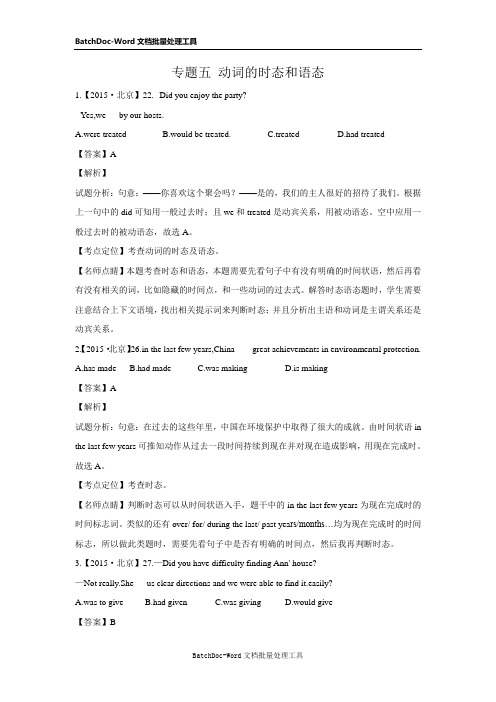
专题五动词的时态和语态1.【2015·北京】22.--Did you enjoy the party?--Yes,we___by our hosts.A.were treatedB.would be treated.C.treatedD.had treated【答案】A【解析】试题分析:句意:——你喜欢这个聚会吗?——是的,我们的主人很好的招待了我们。
根据上一句中的did可知用一般过去时;且we和treated是动宾关系,用被动语态。
空中应用一般过去时的被动语态,故选A。
【考点定位】考查动词的时态及语态。
【名师点睛】本题考查时态和语态,本题需要先看句子中有没有明确的时间状语,然后再看有没有相关的词,比如隐藏的时间点,和一些动词的过去式。
解答时态语态题时,学生需要注意结合上下文语境,找出相关提示词来判断时态;并且分析出主语和动词是主谓关系还是动宾关系。
2.【2015·北京】26.in the last few years,China ___ great achievements in environmental protection.A.has madeB.had madeC.was makingD.is making【答案】A【解析】试题分析:句意:在过去的这些年里,中国在环境保护中取得了很大的成就。
由时间状语in the last few years可推知动作从过去一段时间持续到现在并对现在造成影响,用现在完成时。
故选A。
【考点定位】考查时态。
【名师点睛】判断时态可以从时间状语入手,题干中的in the last few years为现在完成时的时间标志词。
类似的还有over/ for/ during the last/ past yea rs/months…均为现在完成时的时间标志,所以做此类题时,需要先看句子中是否有明确的时间点,然后我再判断时态。
3.【2015·北京】27.—Did you have difficulty finding Ann' house?—Not really.She___us clear directions and we were able to find it.easily?A.was to giveB.had givenC.was givingD.would give【答案】B【考点定位】考查时态。
(完整word版)高考英语语法精讲第5讲动词时态和语态考点精讲与提升
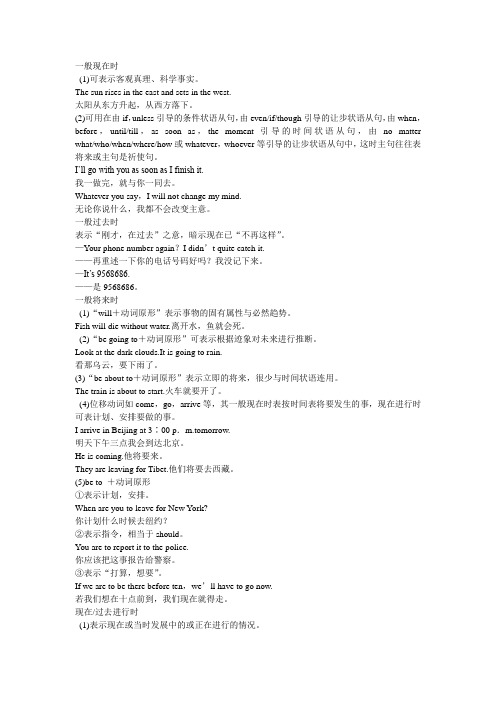
一般现在时(1)可表示客观真理、科学事实。
The sun rises in the east and sets in the west.太阳从东方升起,从西方落下。
(2)可用在由if,unless引导的条件状语从句,由even/if/though引导的让步状语从句,由when,before,until/till,as soon as,the moment引导的时间状语从句,由no matter what/who/when/where/how或whatever,whoever等引导的让步状语从句中,这时主句往往表将来或主句是祈使句。
I’ll go with you as soon as I finish it.我一做完,就与你一同去。
Whatever you say,I will not change my mind.无论你说什么,我都不会改变主意。
一般过去时表示“刚才,在过去”之意,暗示现在已“不再这样”。
—Your phone number again?I didn’t quite catch it.——再重述一下你的电话号码好吗?我没记下来。
—It’s 9568686.——是9568686。
一般将来时(1)“will+动词原形”表示事物的固有属性与必然趋势。
Fish will die without water.离开水,鱼就会死。
(2)“be going to+动词原形”可表示根据迹象对未来进行推断。
Look at the dark clouds.It is going to rain.看那乌云,要下雨了。
(3)“be about to+动词原形”表示立即的将来,很少与时间状语连用。
The train is about to start.火车就要开了。
(4)位移动词如come,go,arrive等,其一般现在时表按时间表将要发生的事,现在进行时可表计划、安排要做的事。
I arrive in Beijing at 3∶00 p.m.tomorrow.明天下午三点我会到达北京。
高考英语动词的时态和语态专题练习
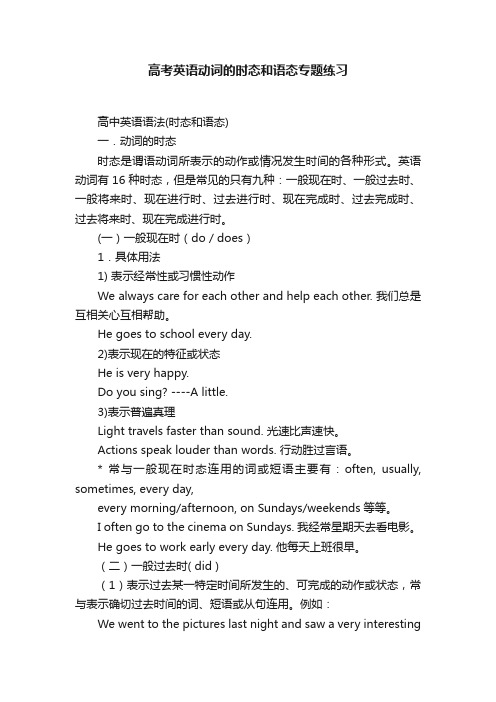
高考英语动词的时态和语态专题练习高中英语语法(时态和语态)一.动词的时态时态是谓语动词所表示的动作或情况发生时间的各种形式。
英语动词有16种时态,但是常见的只有九种:一般现在时、一般过去时、一般将来时、现在进行时、过去进行时、现在完成时、过去完成时、过去将来时、现在完成进行时。
(一)一般现在时(do / does)1.具体用法1) 表示经常性或习惯性动作We always care for each other and help each other. 我们总是互相关心互相帮助。
He goes to school every day.2)表示现在的特征或状态He is very happy.Do you sing? ----A little.3)表示普遍真理Light travels faster than sound. 光速比声速快。
Actions speak louder than words. 行动胜过言语。
* 常与一般现在时态连用的词或短语主要有:often, usually, sometimes, every day,every morning/afternoon, on Sundays/weekends等等。
I often go to the cinema on Sundays. 我经常星期天去看电影。
He goes to work early every day. 他每天上班很早。
(二)一般过去时( did )(1)表示过去某一特定时间所发生的、可完成的动作或状态,常与表示确切过去时间的词、短语或从句连用。
例如:We went to the pictures last night and saw a very interestingfilm.(2)表示过去习惯性动作。
例如:He always went to class last.I used to do my homework in the library.(三)一般将来时( will / shall do)1)表示将来打算进行或期待发生的动作或状态。
2019年高考英语真题分类汇编:专题05-动词的时态和语态(含答案解析)

专题五动词的时态和语态1.【2018·北京】22.--Did you enjoy the party?--Yes,we___by our hosts.A.were treatedB.would be treated.C.treatedD.had treated【答案】A【解析】试题分析:句意:——你喜欢这个聚会吗?——是的,我们的主人很好的招待了我们。
根据上一句中的did可知用一般过去时;且we和treated是动宾关系,用被动语态。
空中应用一般过去时的被动语态,故选A。
【考点定位】考查动词的时态及语态。
【名师点睛】本题考查时态和语态,本题需要先看句子中有没有明确的时间状语,然后再看有没有相关的词,比如隐藏的时间点,和一些动词的过去式。
解答时态语态题时,学生需要注意结合上下文语境,找出相关提示词来判断时态;并且分析出主语和动词是主谓关系还是动宾关系。
2.【2018·北京】26.in the last few years,China ___ great achievements in environmental protection.A.has madeB.had madeC.was makingD.is making【答案】A【解析】试题分析:句意:在过去的这些年里,中国在环境保护中取得了很大的成就。
由时间状语in the last few years 可推知动作从过去一段时间持续到现在并对现在造成影响,用现在完成时。
故选A。
【考点定位】考查时态。
【名师点睛】判断时态可以从时间状语入手,题干中的in the last few years为现在完成时的时间标志词。
类似的还有over/ for/ during the last/ past years/months…均为现在完成时的时间标志,所以做此类题时,需要先看句子中是否有明确的时间点,然后我再判断时态。
3.【2018·北京】27.—Did you have difficulty finding Ann' house?—Not really.She___us clear directions and we were able to find it.easily?A.was to giveB.had givenC.was givingD.would give【答案】B【考点定位】考查时态。
高考英语语法专题讲解与训练-动词的时态和语态

高考英语语法专题讲解与训练之六动词的时态和语态在英语中,不同时间发生的动作或存在的状态,要用不同的动词形式来表示,这就叫做动词的时态。
一、一般现在时1.一般现在时的构成一般现在时主要用动词原形来表示。
主语是第三人称单数时,动词后面要加-s或-es。
第三人称单数的动词变化规则(只有在第三人称为主语的肯定句中,动词才用三单式)(1)多数动词直接加s:runs gets likes collects takes plays climbs(2)结尾是s, x, sh, ch, o,前为辅音字母,结尾加es :Watch— ___________ teach—___________ go— ___________ do— __________ wash— ___________ cross— ___________ mix— __________ brush— _________ (3)动词末尾y前为辅音:将y改为i加es:study→_________ fly→________ carry→________ cry→________但在y前如果为元音则直接加s: buys says2.一般现在时的基本用法(1)表示客观事实、普通真理或格言警句(不受主句时态限制)1)The geography teacher told us the earth _____ ____around the sun. (move)2)Water ________at 100o C. (boil)3)Pride ________ before a fall. (go)(2)表示现状、性质、状态时多用系动词或状态动词;表示经常或习惯性的动作,多用动作动词,且常与表频率的时间状语连用,例如:every…, often,always,sometimes, never,seldom, on Sundays。
1)Ice _______cold. (feel )2)We always _____________each other and help each other.(care for )(3)表示知觉、态度、感情、某种抽象的关系或概念的词常用一般现在时:see、hear、smell、taste、feel、notice、agree、believe、like、hate、want、think、belong、seem等。
2023年高考真题和模拟题英语分项汇:专题05 动词的时态、语态和主谓一致(解析版)(全国通用)
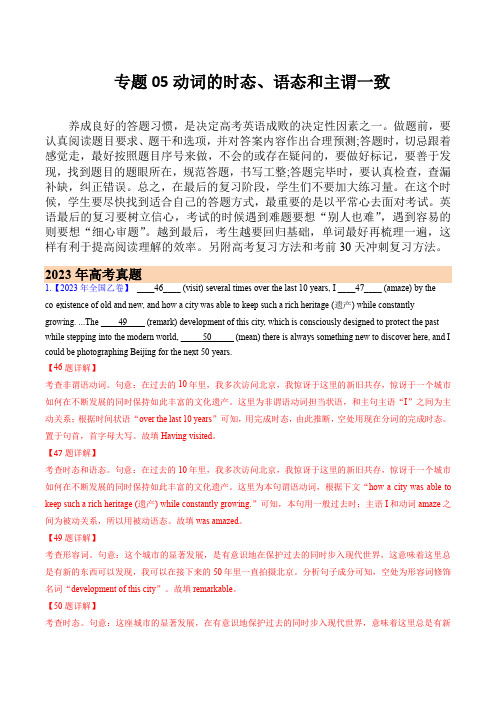
专题05动词的时态、语态和主谓一致养成良好的答题习惯,是决定高考英语成败的决定性因素之一。
做题前,要认真阅读题目要求、题干和选项,并对答案内容作出合理预测;答题时,切忌跟着感觉走,最好按照题目序号来做,不会的或存在疑问的,要做好标记,要善于发现,找到题目的题眼所在,规范答题,书写工整;答题完毕时,要认真检查,查漏补缺,纠正错误。
总之,在最后的复习阶段,学生们不要加大练习量。
在这个时候,学生要尽快找到适合自己的答题方式,最重要的是以平常心去面对考试。
英语最后的复习要树立信心,考试的时候遇到难题要想“别人也难”,遇到容易的则要想“细心审题”。
越到最后,考生越要回归基础,单词最好再梳理一遍,这样有利于提高阅读理解的效率。
另附高考复习方法和考前30天冲刺复习方法。
2023年高考真题1.【2023年全国乙卷】____46____ (visit) several times over the last 10 years, I ____47____ (amaze) by theco-existence of old and new, and how a city was able to keep such a rich heritage (遗产) while constantly growing. ...The ____49____ (remark) development of this city, which is consciously designed to protect the past while stepping into the modern world, _____50_____ (mean) there is always something new to discover here, and I could be photographing Beijing for the next 50 years.【46题详解】考查非谓语动词。
高考英语二轮总复习 第一部分 语篇型语法填空和短文改错 专题五 动词的时态和语态

现在完成时 have/has done
I have travelled to four European countries so far.
类别
构成形式(以do为例) 例句
现在完成进行时 have/has been doing He has been working all the morning.
专题五 动词的时态和语态
第一部分
英语
内容索引
基础自诊•夯基固本 高频考点•探究突破 新题演练•能力迁移
基础自诊•夯基固本
词汇复习5(根据汉语提示填入以b开头的单词的适当形式,然后背诵情景, 熟记以b开头的课标高频词汇。) 【情景】 In her 1.___b_io_g_r_a_p_h_y___(传记) the beautiful writer described that she was a blind girl,who believed firmly that good 2. _b_e_h_a_v_io_r____ (行为)
6.(2018·北京卷改编)—Hi,I’m Peter.Are you new here?I haven’t seen you around. —Hello,Peter.I’m Bob.I just ____s_t_a_rt_e_d____(start) on Monday. 解析:考查动词的时态。句意:——你好,我是彼得。你是新来的吗?我在这 儿没见过你。——你好,彼得。我是鲍勃。我是周一来的。根据时间状语 on Monday可知,此处讲述的是发生在过去的事情,应用一般过去时。
3.(2020·全国Ⅰ卷改编)This really excites scientists,because it means we have the chance to obtain information about how the moon __i_s _c_o_n_s_tr_u_c_te_d______(construct). 解析:考查动词的时态和语态。句中的主语the moon和谓语动词construct 之间为被动关系且句子描述的是一种客观情况,故用被动语态的一般现 在时。 4.(2020·全国Ⅰ卷)The unmanned Chang’e-4 probe(探测器)—the name was inspired by an ancient Chinese moon goddess—___to_u_c_h_e_d_______(touch) down last week in the South Pole-Aitken basin. 解析:考查谓语动词的时态。根据时间状语last week 判断该用一般过去时。
高考英语动词的时态和语态考点归纳与真题演练
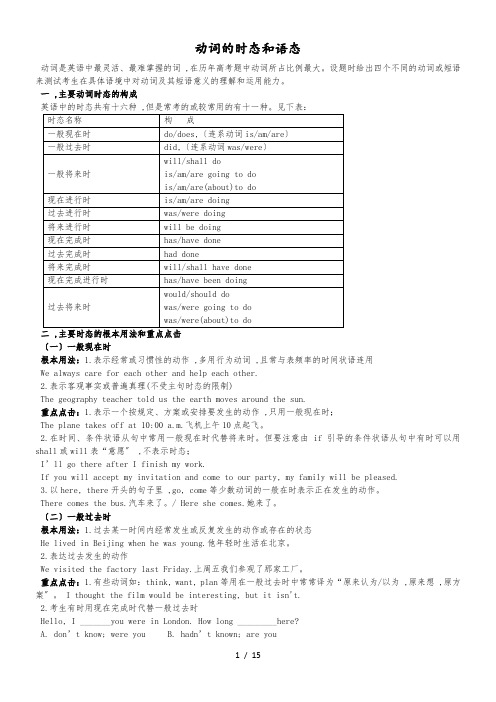
动词的时态和语态动词是英语中最灵活、最难掌握的词 ,在历年高考题中动词所占比例最大。
设题时给出四个不同的动词或短语来测试考生在具体语境中对动词及其短语意义的理解和运用能力。
一 ,主要动词时态的构成英语中的时态共有十六种 ,但是常考的或较常用的有十一种。
见下表:二 ,主要时态的根本用法和重点点击〔一〕一般现在时根本用法:1.表示经常或习惯性的动作 ,多用行为动词 ,且常与表频率的时间状语连用We always care for each other and help each other.2.表示客观事实或普遍真理(不受主句时态的限制)The geography teacher told us the earth moves around the sun.重点点击:1.表示一个按规定、方案或安排要发生的动作 ,只用一般现在时;The plane takes off at 10:00 a.m.飞机上午10点起飞。
2.在时间、条件状语从句中常用一般现在时代替将来时。
但要注意由if 引导的条件状语从句中有时可以用shall或will表“意愿〞 ,不表示时态;I’ll go there after I finish my work.If you will accept my invitation and come to our party, my family will be pleased.3.以here, there开头的句子里 ,go, come等少数动词的一般在时表示正在发生的动作。
There comes the bus.汽车来了。
/ Here she comes.她来了。
〔二〕一般过去时根本用法:1.过去某一时间内经常发生或反复发生的动作或存在的状态He lived in Beijing when he was young.他年轻时生活在北京。
2.表达过去发生的动作We visited the factory last Friday.上周五我们参观了那家工厂。
- 1、下载文档前请自行甄别文档内容的完整性,平台不提供额外的编辑、内容补充、找答案等附加服务。
- 2、"仅部分预览"的文档,不可在线预览部分如存在完整性等问题,可反馈申请退款(可完整预览的文档不适用该条件!)。
- 3、如文档侵犯您的权益,请联系客服反馈,我们会尽快为您处理(人工客服工作时间:9:00-18:30)。
动词的时态和语态【考点分析】1.对下列十种时态的考查:一般现在时一般过去时一般将来时现在进行时过去进行时现在完成时现在完成进行时过去完成时将来完成时过去将来时2.既考查时态又考查语态;3.考查动词的及物与不及物;4.考查主动形式表示被动意义;5.考查动词词组在被动语态中的介词问题;6.对被动语态习惯句型的考查。
【知识点归纳】I.动词时态和语态的构成形式主动语态的构成一般现在时一般过去时do/does,( is/am/are )did,(was/were)现在进行时过去进行时is/am/are doingwas/were doing现在完成时过去完成时has/have donehad done现在完成进行时过去完成进行时has/have been doinghad been doing一般将来时过去将来时will/shall dois/am/are going to dois/am/are(about)to dowould/should dowas/were going to dowas/were(about)to do被动语态的构成一般现在时一般过去时is/am/are donewas/were done现在进行时过去进行时is/am/are being donewas/were being done现在完成时过去完成时has/have been donehad been done一般将来时过去将来时will/shall be doneis/am/are going to be doneis/am/are(about)to be donewould/should be donewas/were going to be donewas/were(about)to be doneII.动词时态的用法1.一般现在时①一般现在时表示经常发生、习惯性动作、客观真理、科学事实、格言,目前的特征、状态、能力等;②主句是一般将来时,时间、条件状语从句中用一般现在时表示将来;I’ll go there after I finish my work.I f it rains tomorrow,I won’t go there.③在以here,there开头的句子里,go,come等少数动词的一般在时表示正在发生的动作;There goes the bell.铃响了。
There comes the bus.汽车来了。
Here she comes.她来了。
注意:近几年,对一般现在时的考查常用过去时态或现在完成时态对考生进行干扰Months ago we sailed ten thousand miles across the open sea, which_____ the Pacific,and we met no storm.A. was calledB. is calledC. had been calledD. has been called虽然航海发生在过去,但是,海洋的名称不会因此而变化,所以要用一般现在时。
2.现在进行时①表示正在进行的动作;②表示按计划安排即将发生的动作。
She is leaving for Beijing.她要去北京。
He is working as a teacher tomorrow.从明天起他要做老师。
My father is coming to see me this Saturday.这个星期六我爸爸要来看我。
③代替一般现在时,描绘更加生动。
The Changjiang River is flowing into the east.江水滚滚向东流。
The sun is rising in the east.太阳从东方冉冉升起。
④与always, forever, constantly, continually连用,表示赞赏或厌恶等感情色彩,但并非强调动作正在进行;He is always helping others.他总是肯帮助他人。
She is always forgetting something.她老是忘记某些事情。
⑤大多数动词可用于进行时,但也有些动词不用于进行时。
常见的有:▲感觉类:look, smell, feel, sound, taste, see, hear▲情感类:like, love, prefer, admire, hate, fear▲心态类:wish, hope, expect, want, need, believe, think, understand, agree, knowt▲所有类:have, contain, won, hold, belong to等。
3.现在完成时①表示过去发生的动作对现在产生的影响或结果,或说话时已完成的动作;I have finished the report./ She has cleaned the room.②表示从过去开始,待续到现在的动作或状态,往往和“for...”, “since...”表述的一段时间状语连用;He has learned English for six years./ They have worked here since they left college.③表示“曾经到过某地(人已回来)”用“have/has been to”;表示“到某地去了(还未回来)”用“have/has gone to”。
—Where is Li Hua? -He has gone to the reading-room.—She knows a lot about Shanghai. -She has been there.④在时间状语从句,条件状语从句或让步状语从句中表达将来某时已经完成的动作。
When you have learned English, you will find it a bridge to so much knowledge.We’ll start at six if it has stopped raining by then.注意:这里的现在完成时强调从句动作在主句动作之前完成, 如果两个动作同时或几乎同时发生, 则不必用完成时;试比较:I’ll let you know as soon as I hear from her.She will call you when she gets home.⑤短暂动词(即瞬间动词),join,lose,buy,borrow,leave,go,come,arrive,die,marry, finish,complete,begin,start,break out等,在完成时态中,其肯定式不能和表示一段时间的状语连用。
要译“他参军已经三年了”不能说:He has joined the army three years.可采用:▲“ago法”:He joined the army three years ago.▲“延续法”:He has been in the army for three years.▲“since法”:It is/has been three years since he joined the army.注意:没有包括“现在”在内或不是截至“现在”为止的时间状语不能与现在完成时连用, 但“in(over) thepast/last+时间段”要与现在完成时连用。
4.现在完成进行时①用来表示从过去某一时刻开始一直持续到现在(或今后还要继续一去)的动作;He has been doing the maths problems since 8:00.②凡是不能用于现在进行时的动词均不能用于现成完成进行时。
5.一般过去时①表达特定的过去时间内发生的动作或存在的状况,或过去某一时间内经常发生或反复发生的动作或为;He often sang when he was a boy.He went to the cinema last night with her boy friend.②用于I didn’t know…或I forgot…,表示事先不知道或不记得,但现在已知道或记得的事情。
用于I didn’t know…或I forgot…,表示事先不知道或不记得,但现在已知道或记得的事情。
I didn’t know you were here.(现在已经知道)Sorry, I forgot to bring my book.(“忘记带书”已成为过去的事了)这一用法考生要特别注意。
注意:参看过去将来时的用法②。
6.过去进行时①表示过去某一时刻或某一段时间内正在进行的动作(这一过去时间须用时间状语表示);He was preparing his lecture all day yesterday.②表示动作在另一过去动作发生时进行;They were still working when I left.③用在两个过去进行时动作同时发生;I was writing while he was watching TV.④过去计划、安排好的将来动作(只限于come, go, leave, arrive, start, move, sail, fly, travel, stay等);He said she was arriving the next day.⑤与always, forever, constantly, continually连用,表示赞赏或厌恶等感情色彩。
(参看现在进行时的用法④)Comrade Lei Feng was always thinking of others never thinking of himself.⑥过去进行时可用来描绘故事发行的背景。
The wind was blowing and it was raining hard.7.过去完成时①表示在过去某一时间以前已经完成的动作。
He had shut the door before the dog came up.Everything had been all right up till this morning.②表示动作或状态从过去某个时刻开始一直延续到另一个过去时刻才完成,甚至还要继续下去。
At the age of ten,he had learned 500 English words.He had been ill for a week when we learned about it.③过去未曾实现的意图、打算或希望(只限于think, want, plan, mean, intend, hope, expect, suppose,wish, want等动词)。
